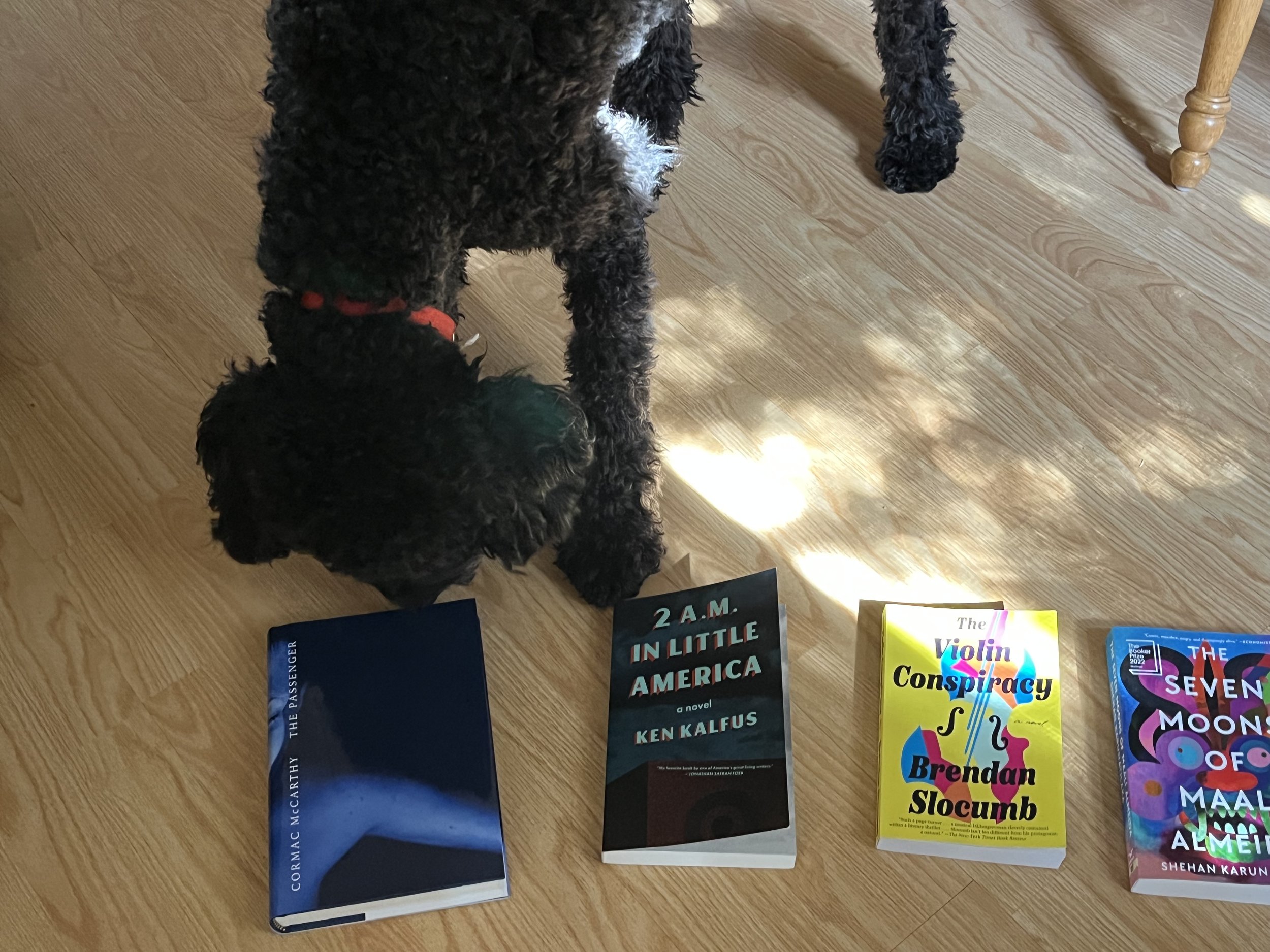Olga Dies Dreaming v. Nightcrawling
The 2023 Tournament of Books, presented by Field Notes, is an annual battle royale among the best novels of the previous year.
MARCH 20 • OPENING ROUND
Olga Dies Dreaming
v. Nightcrawling
Judged by Abayomi Animashaun
Abayomi Animashaun (he/him) is the author of three poetry collections and editor of three anthologies. He is an assistant professor of English at the University of Wisconsin, Oshkosh, and a poetry editor at The Comstock Review. Known connections to this year’s contenders: None. / abayomianimashaun.com
As a reader, I’m drawn to honest, well-crafted stories that grapple with the human condition. I’m partial to fiction that, as Wallace Stegner says, acts as a lens on life. Good stories, regardless of how they’re conceived, also remind us of who we are. With that in mind, I believe Olga Dies Dreaming and Nightcrawling are engaging works that manage to hold up complex (often disturbing) portraits of who we are as humans, but with varying degrees of success due to vision and attention to craft.
Olga Dies Dreaming is an ambitious novel that attempts to shed light on the plight of Puerto Rico as a colony of the United States, the immigrant experiences of Puerto Ricans, the beauty and underbelly of politics, and the consequences of standing for a cause (without compromise, without regard for one’s children, and with a willingness to use those children as political pawns), all in the wake of a major hurricane that devastates Puerto Rico, leaving many dead and injured and leaving thousands more without food, light, and basic amenities.
There’s much to admire about this novel, which manages to take readers through multiple locations and timeframes through the utilization of epistolary and normative storytelling. As an immigrant (one of the Black and brown people the novel talks so much about), I like the mention given to the burden of assimilation, as seen with the letter dated Oct. 5, 2006. I also like the attention given to Puerto Rico, a country whose people are US citizens, yet the country itself is not considered part of the US. Among the strengths of the novel, then, is the willingness to question whether the United States (through its policies) always has Puerto Rico’s best interest.
This novel turns that linear narrative on its head.
Moreover, I’m drawn to how, through Prieto (Olga’s brother), in the chapter titled “The Lift,” it’s made clear that the state of Puerto Rico today is not removed from its colonial history and policies, and how, without a knowledge of both the history and policies, Puerto Rico can come across as helpless, burdensome, and unable.
“Of course, the people on the island and people like you and me… we know that this mess is the result of fucked-up colonial policies that leave them victims to the mainland’s whims. But, to the rest of America? Puerto Ricans look like they just can’t handle the little bit of government we’ve been given.”
Another highlight for me is the focus on diversity within the Puerto Rican community in the US. I can’t even begin to think of the number of times I’ve heard people talk about Puerto Ricans as though they’re a monolith, as if to see one is to see all. This novel turns that linear narrative on its head. Here, we also get the messy business of family with its shifting loyalties, affections, frustrations, and uncertainties. Against this backdrop is the dynamic between Olga and her absent mother—Olga, the daughter who has found a way to profit from the same capitalist society that her mother, the self-styled revolutionary, seems to be fighting against by being a self-made wedding planner who has no qualms about price gouging members of New York’s high society.
FROM OUR SPONSOR
The novel, however, could have benefited from better pacing. With so many threads, the pacing is aided somewhat by the utilization of letters—sent over the span of two-and-a-half decades to Olga and Prieto by their mother. However, more attention could have been given to this important component of storytelling. Also, some of the chapter titles could have benefited from greater consideration. I came away from the novel with the impression that there wasn’t always a clear sense of how to title chapters. Titles, of course, can serve a variety of functions. But what’s one to make of the following: “A Man Named Dick” and “Dick’s No Good, Very Bad Day?” In the end, one wonders if the novel shouldn’t have been reduced by a third and if more shouldn’t have been done to arrive at a satisfying resolution.
Nightcrawling, on the other hand, is a well-paced story written with unflinching grit! The novel is set in Oakland and it follows Kiara, a 17-year-old African American girl, who is doing all she can to survive in a community where opportunities are few and dreams are seldom realized, a community where crime is prevalent and one can’t always count on law enforcement officers to be on the side of the law. Inspired by real-life events in the Bay Area, this book raises a number of important questions, one being about the nature of justice itself (or the absence thereof) in underserved communities of color where Black and brown people are often dehumanized by people in uniform.
Among the beauties of this novel too is the believability of the characters and the command with which the story is told.
Yet despite the grotesqueness of the story’s tableau, there are moments of genuine tenderness that offer a wonderful contrast to the story’s many instances of brutality. Consider this passage from page 163, when Kiara is talking about her near-adopted son Trevor:
Alé waves [Trevor] over and he practically runs to us. I don’t remember him taking off his shirt, but he isn’t wearing it no more and his bare torso makes me want to scoop him up and cradle him, lengthening body and all. That boy is a wonder. He’s my autumn rain. My last picture of the sun before it sets. Daytime is not possible without Trevor. Not even sure the sun comes out without Trevor.
Among the beauties of this novel too is the believability of the characters and the command with which the story is told. None of the major characters, from Kiara to Trevor, feel flat and the story is sometimes rendered in such wonderful language that one marvels at the poetry, wisdom, and wit with which the language is conceived. “Even if I tried to fight them, these are not the men who would care. These are the men who load their guns and point them with a grin, who find a girl in an alley and decide she is theirs.”
That said, though I’m choosing this novel, I wonder if more shouldn’t have been said about the officer whose suicide and suicide note gets Kiara entwined with the law. Also, I wonder if there isn’t an over-reliance on flashbacks in the second half of the book. Still, I find the resolution a satisfying conclusion to a story that, on the whole, is well-told.
Advancing:
Nightcrawling
Match Commentary
with Kevin Guilfoile and John Warner
Kevin Guilfoile: I have read a lot of works in progress and unpublished stories. Not as many as you, John, but a lot. And by far the most common mistake I see is writers who spend a lot of time clearing their throat before they get into the story they want to tell. The fix is usually easy. Get rid of the first five or 10 or 20 pages, or whatever. You don’t need them. The best version of this story doesn’t begin where you think it does. Most writers hate to hear it, but it’s almost always true.
Nightcrawling has a lot of on-ramp. It takes a lot of pages to get to what I would normally call the real beginning of this story, which is timely and compelling, and ordinarily I would say get right into it. But in this case, Kiara’s voice is so damn compelling that you learn a tremendous amount, not from the stuff that happens in those first few chapters, but from the way Kiara is telling it. It is a captivating and believable point of view, and if I had been an early reader and had given Mottley my usual advice, she would have been right to tell me to piss off. Nightcrawling was engrossing to me from the edition notice.
John Warner: This is really interesting because—true confession—I did not make it past the on-ramp for Nightcrawling. It was very much related to what else was going on at the time, that I had a bit of a time pressure on finishing a different book for a different reason, so I needed Nightcrawling to grab me pretty quickly and compel me to keep moving forward, and when it didn’t happen, I jumped to the other book.
I also admit that Nightcrawling had a voice that I admired, but that also didn't connect with me. It struck me as writerly, for lack of a better word, and I kept getting pulled out of the narrative to pause and reflect on the manner of telling. I don’t think it was the kind of “throat clearing” that I tend to think can be cut without doing any harm to the intentions of the story, but I was looking for something else at the time.
Reading Judge Animashaun’s rendering and your comments does make me reconsider and wonder if I should make another run at it under more favorable conditions.
Kevin: One of the most difficult things when talking about literature is recognizing (and then describing) all the intangible elements that draw us into a story, or the ones that repel us. You and I are pretty similar dudes with similar backgrounds. I like a lot of the same things you like. Why did this novel land differently for me—and for Judge Animashaun—than you? Was it some small moment of recognition that I found in those early pages? Something that made me laugh? Made me cry? Something I didn’t even consciously notice? I can’t tell you except to say that the way Kiara spoke made me want her to keep talking.
John: This is going to seem like a weird comment, but for me I thought Olga Dies Dreaming wanted to be either shorter and tighter, more focused on Olga’s arc, or much longer and more sprawling, a bigger tapestry exploring the full range of the Puerto Rican diaspora.
When I settled into each chapter I was carried along by the novel’s wit and line-to-line snap, but I did not experience a strong sense of narrative connective tissue from chapter to chapter. Perhaps this is similar to Judge Animashaun’s issue with pacing, but it feels a little different. In the big picture, I understood why these stories are being told alongside each other, but I felt neither fully satisfied by the scope, nor fully drawn in by the plot.
Maybe I should call myself Goldilocks this round.
Kevin: When I was a kid most of our vacations were related to my dad’s work and when I was very young, he had to make several trips to Puerto Rico and we tagged along for at least two of them. Some of the most vivid memories I have of being eight years old and under are walking the beautiful streets of Old San Juan, and fishing in the ocean off the Puerto Rican shore. I think partially because of those good memories I have always been curious about the Puerto Rican independence movement and that was enough of a hook to bring me into this story pretty quickly. I think I know what you mean, however. Some of the historical exposition felt a little stiff and superficial. The bones of this novel probably could have supported more weight, but I still liked the story Gonzalez chose to tell.
That wraps up our opening round, which means it is time for the announcement of the early Zombie Round contenders. For those who are new to the ToB, we conducted a pre-Tournament poll of readers to find their favorite books on the shortlist. When the judges eventually narrow the field to two, we will take the two most popular novels from among those previously eliminated and bring them back from the dead to do battle against the judges’ finalists. No one gets the Rooster without fighting through a locked barn of brain-eating undead novels.
These results can change as more books are eliminated. But if the Zombie Round were held today, the two fungally infected fictions would be Babel and Mercury Pictures Presents. Unfortunately, that means we say our goodbyes to 2 A.M. in Little America, Dinosaurs, An Island, Manhunt, My Volcano, Olga Dies Dreaming, The Passenger, and The Seven Moons of Maali Almeida.
The quarterfinals begins tomorrow as Mouth to Mouth takes on The Book of Goose.
Today’s mascot
Today’s mascot is Pegasus, via Catherine, Alejandro, and Sebastian. Pegasus is a one-year-old bernedoodle who lives near Pittsburgh. Pegasus’s greatest love in life is food in all its forms. He wishes humans would be more open-minded to delicacies like chewed gum, lightly used tissues swiped from pockets, and deer poop. If Pegasus could read, he would read cookbooks and culinary travelogs; he doesn’t quite understand why being an omnivore is a dilemma. Catherine says, “This year, we placed some of the Rooster contestants on the floor before him, and he appears to be leaning (literally) toward The Passenger as his winner. Sadly, he was not able to vote for it in the Zombie Round.” Catherine adds that the Rooster holds a special place in her and Alejandro’s hearts: The first winner, Cloud Atlas, is the reason they started dating and got married. So everything that followed after, like Sebastian and Pegasus, can be considered a product of great literature!
Welcome to the Commentariat
To keep our comments section as inclusive as possible for the book-loving public, please follow the guidelines below. We reserve the right to delete inappropriate or abusive comments, such as ad hominem attacks. We ban users who repeatedly post inappropriate comments.
Criticize ideas, not people. Divisiveness can be a result of debates over things we truly care about; err on the side of being generous. Let’s talk and debate and gnash our book-chewing teeth with love and respect for the Rooster community, judges, authors, commentators, and commenters alike.
If you’re uninterested in a line of discussion from an individual user, you can privately block them within Disqus to hide their comments (though they’ll still see your posts).
While it’s not required, you can use the Disqus <spoiler> tag to hide book details that may spoil the reading experience for others, e.g., “<spoiler>Dumbledore dies.<spoiler>”
We all feel passionately about fiction, but “you’re an idiot if you loved/hated this book that I hated/loved” isn't an argument—it’s just rude. Take a breath.




